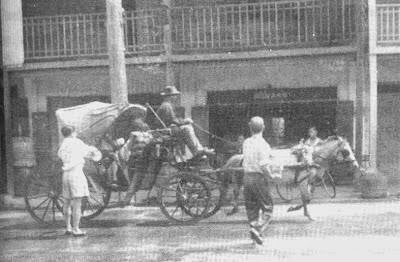Oh, and then there is the other thing, the water fights. Many people claim that in the halcyon days of yore Songkran was a peaceful time in which Thais would sprinkle a few drops of water on the shoulder or back of the neck of their friends and neighbors. There was none of this roughhousing and endless silliness that we have to put up with today. Well, it ain't exactly so. While the scene in Chiang Mai has gotten a bit over-the-top with the super soakers and the barrels of ice water in the backs of pickup trucks, and the whole thing lasting five days, Songkran never was an afternoon picnic in the garden with watercress sandwiches.
I'm going to tell you the true origins of water fighting during Songkran. About a thousand years ago in Sukhothai on the first day of Songkran Nong Nut found a coconut shell. He ran down to the stream and filled it with water. He then dumped it on his sister, Nong Nuey's head. It was on between the two of them and it quickly spread to the rest of the village. It's been on ever since.
As you can see in these vintage photos people have been throwing water and getting soaked for a long time.
Another myth about Songkran is that it was ruined when foreigners started coming to Thailand. That's a canard. Foreigners certainly haven't improved Songkran, particularly here in Chiang Mai, but we have amply evidence from recent history that Thais are perfectly capable of ruining Thailand without any outside help whatsoever.
Thais still do the traditional things at Songkran, sand chedis, paying respect to elders, etc., but they also play water with abandon. So, whether you love it or grit your teeth and bear it, maintain your jai yen and remember that it will be over in a couple of days.





No comments:
Post a Comment